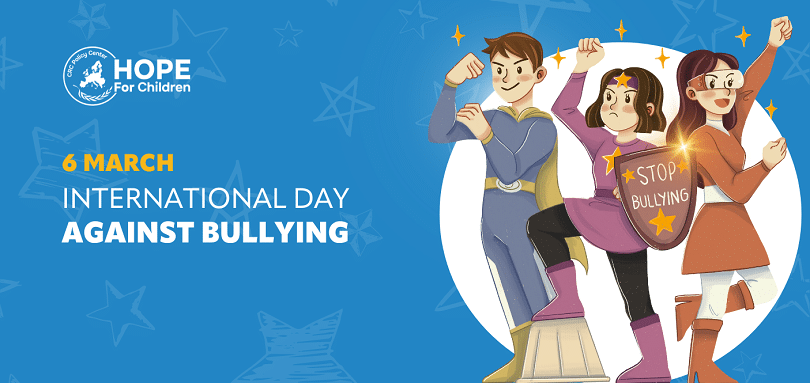Hope for Children CRC Policy Center honours the International Day Against Bullying on March 6, shedding light on the escalating phenomenon rising in Cyprus, as confirmed by the comprehensive research study to analyse the prevalence of violence in Cyprus.
Bullying can be defined as an “aggressive, repeated, intentional behaviour involving an imbalance of power aimed toward an individual or group of individuals who cannot easily defend themselves” (Vaillancourt et al., 2008).
Research has shown that bullying affects the general well-being of those involved, and is associated with severe symptoms of mental health problems, low self-esteem, academic challenges and persistent psychological stress. This also includes self-harm and suicidality, difficulties concentrating, headaches, stomach pain, feeling tense, sad and/or dizzy, sudden mood changes, disturbances in sleep patterns, and an inclination to withdraw from social interactions.
Meanwhile, there are different types of bullying: physical, verbal, emotional and cyberbullying.
Physical bullying involves physical acts of aggression or violence, such as hitting, kicking, pushing, or damaging someone’s property. Verbal bullying sees words used to hurt, intimidate, or belittle others through name-calling, insults, teasing, or spreading rumours. Emotional bullying, meanwhile, also known as psychological bullying, includes manipulating, isolating, or excluding individuals to undermine their self-esteem and mental well-being. Finally, cyberbullying takes place digitally, such as via social media, text messages, emails, or online forums, with harassment, humiliation, or threats towards others, both anonymously or publicly. While physical and cyberbullying are often of greatest concern, social and verbal bullying are the most common forms students encounter and are the most difficult to identify.
As part of the ongoing National Strategy for Prevention and Management of School Violence (2018-2024), a comprehensive research study was conducted to analyze the prevalence of school violence in Cyprus.
The latest findings from this longitudinal study spanning 2019-24, and supervised by University of Cyprus psychology professor Kostas Fantis, were unveiled in October 2023, and revealed that one in four students admits to being a victim of bullying, both within the school context and online. This indicates a distressing escalation of this issue over the past three years.
Key highlights from the research include the continued observation by over 95 per cent of educators of instances of violence among students, emphasising the pervasive nature of the issue within school settings. Additionally, it reveals that one in five teenagers falls prey to cyberbullying, aligning with broader European data on digital harassment. Moreover, the research indicates that one in 10 children experiences marginalisation, further emphasising the urgent need for targeted interventions and support mechanisms.
Also per the study, more than half of students adopt a passive bystander role during incidents of school violence, with only 18 per cent actively defending or comforting victims. These findings underscore the critical imperative to address and combat school bullying effectively.
When a child has been identified as a victim of bullying, it is imperative both parents and teachers take immediate and decisive action to address the situation. This includes listening and offering support to the child, reporting the situation to school authorities, documenting incidents, seeking professional help if necessary, encouraging open communication, teaching coping strategies, and fostering a culture of respect and empathy. By taking these proactive steps, we can create a safer and more supportive environment for all children, ensuring that every young person feels valued, respected and empowered to thrive.
Hope For Children CRC Policy Center conducts experiential workshops for the prevention and handling of school bullying. Two of the programmes offered are “Beat Bullying”, which educates students, through non-formal education, to deal with the phenomenon, and the operation of CRC Clubs in schools to educate kids about their rights and responsibilities as set out in the Convention on the Rights of the Child and to act as Ambassadors of the Rights of the Child in their schools.
Simultaneously, in cooperation with SPAVO, the Organisation operates the European Helpline for Children and Teenagers 116111, which enables all young people to call for free, anonymously, and to receive guidance and psychological support. Additionally, the Hope For Children offers free psychological and counselling services for children and parents, as well as remote guidance via the national support line 1466.
For further information about Hope For Children CRC Policy Center programmes and services, call 1466, or check out the resources of the 24/7 online platform: www.uncrcpc.org.cy.







Click here to change your cookie preferences